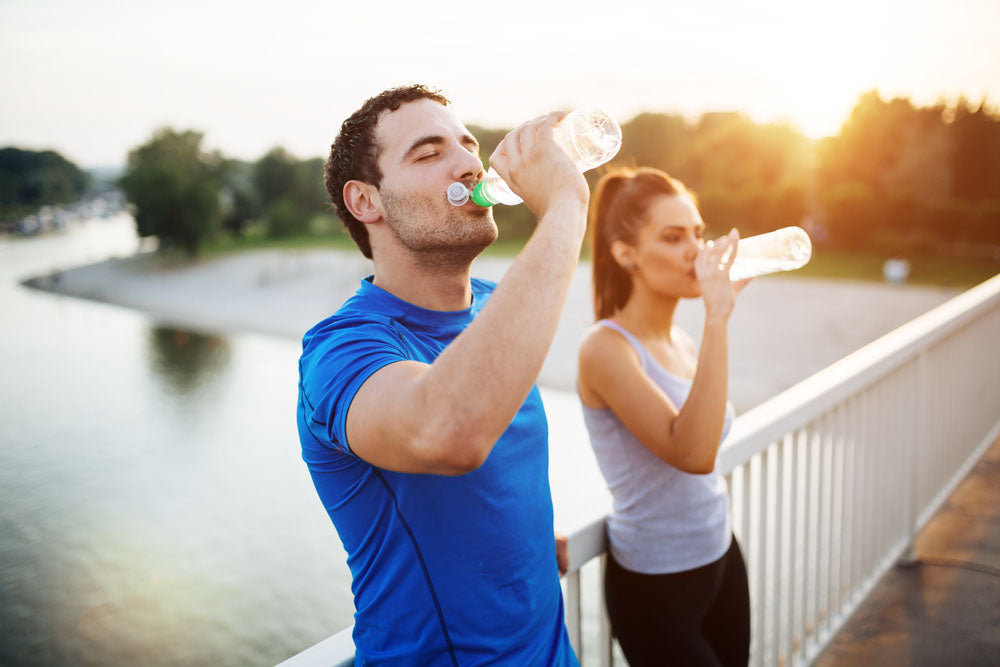
Four Essential Hydration Strategies for Athletes
Share
Source: NDAB Creativity/Shutterstock.com
No matter if you exercise just to stay in shape or are a serious athlete training for competition, staying hydrated is critical for reaching peak performance.
Hydrating properly means consuming the right amount of fluids and electrolytes before, during and after (and in-between) each training session.
Because water lubricates joints, transports key nutrients, regulates body temperature and serves a variety of other functions, it is important to establish hydration strategies for athletes to implement and optimize their efforts.
Shop Our Variety of Electrolyte Powder Before Your Next Competition!To help with that aim, here are four hydration strategies for athletes to maintain a better physical and mental state.
1. Figure Out How Much Water You Need
One of the most important hydration strategies for athletes to implement is understanding their water consumption needs.
A simple way to do this is to divide your body weight by two and drink that many ounces of water per day. Therefore, if you weigh 174 pounds, you will want to drink 87 ounces of water per day.
However, this is an oversimplified formula, as there are other factors that will impact the exact number, including:
- Age
- Gender
- Body size
- Activity level
- Season
- Climate (level of humidity)
2. Create a Hydration Plan
In order for hydration strategies for athletes to work, there needs to be an overarching hydration plan. You should map out your daily water consumption in relation to your workouts or training sessions.

Source: oneinchpunch/Shutterstock.com
Your hydration plan could look something like this:
Prior to Training
Consume 16 to 20 ounces of water at least one hour before your training session.
During Training
If planning to exercise for more than an hour, take breaks every 20 minutes to rehydrate. Additionally, be sure to purchase electrolyte powder to mix in with your water to replenish essential minerals like sodium and magnesium.
Also, do not wait until you are thirsty before you decide to take a drink. Instead, be proactive about your hydration.
After Training
At this point, you will need to consume 20 ounces of fluid for each pound lost during your training session. This will need to be done within the first two hours after your workout. To aid in the process, you might consider buying hydration capsules, as these can be an effective tool for staying hydrated and replenishing electrolytes.
3. Eat a Water-Rich Diet
Drinking fluids is not the only way to stay hydrated. In fact, smart hydration strategies for athletes integrate a variety of water-rich foods to help supplement and support their overall plan. Additionally, since many water-rich foods are “healthy,” this one should work its way in pretty naturally.

Source: Alexander Raths/Shutterstock.com
Some excellent options for foods with a high water content include:
- Cucumbers
- Iceberg lettuce
- Tomatoes
- Zucchini
- Broccoli
- Carrots
- Cantaloupe
- Strawberries
- Watermelon
- Oranges
4. Gamify Your Hydration Plan
Given that athletes are always looking for new horizons to conquer, it only makes sense that a great way to get hydrated is to turn the process into a game.
Therefore, it is wise to create a hydration log to keep track of how many ounces of water you are drinking in a day and the amount of high-water foods consumed. You can also carry a large water bottle marked at an appropriate spot to help meet your target.
Of course, you will need to come up with specific rewards for achieving your consumption needs. Consider implementing small rewards daily and larger ones weekly. After all, reward systems can be powerful motivators for helping to achieve specific goals.
Implementing the Right Hydration Strategies for Athletes
Given how critical hydration is to mental and physical performance, establishing effective hydration strategies and an overarching plan is critical for overcoming the competition.
However, these are just some hydration strategies for athletes to optimize their efforts. Try these tactics out, but if one of them doesn’t work for you, then test out something new. Just make sure that you are staying well-hydrated.
